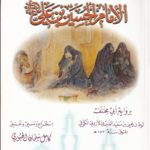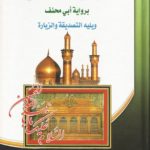Ali Al-Akbar at Karbala
The following article examines Ali Al-Akbar, his biography, and his involvement at Karbala by comparing the Shia narrations and their development through time. Like our previous articles on Muslim bin Aqeel and Abu Al-Fadl Al-Abbas, we are have decided to provide the reader with the two versions of Maqtal Al-Hussain by Abi Mikhnaf Lut bin Yahya.
For the sake of clarity, we have split the article into the following sections:
-
Who is Ali Al-Akbar?
-
Karbala Sources for this Study
-
Ali Al-Akbar at Karbala by Abi Mikhnaf (Original Version)
-
Ali Al-Akbar at Karbala by Abi Mikhnaf (“Improved” Version)
-
A Brief Analysis and Conclusion
Who is Ali Al-Akbar?
He is Ali bin Al-Hussain bin Ali bin Abi Talib. His mother is Layla the daughter of Abi Murra bin Urwa bin Mas’oud Al-Thaqafi. Her mother is Maymoona bint Abi Sufyan bin Harb bin Umayyah. (Refer to Zaidi source Maqatil Al-Talibiyeen).
In other words, Ali Al-Akbar is the product of a marriage between Al-Hussain and the grand-daughter of Abi Sufyan. We can also come to the conclusion that this marriage occurred before the death of Uthman since Ali Al-Akbar was born before Ali Al-Asghar, who was born during the last years of the caliphate of Uthman.
This establishes that Bani Hashim and Bani Umayyah were initially on good terms.
Ali is known as Ali Al-Akbar (the elder) because Al-Hussain had two sons named Ali. Ali Al-Asghar (the younger) is also known as Zain Al-Abideen, the fourth of the Twelve Imams.
Ibn Sa’ad states in the biography of Ali Al-Asghar that Ali Al-Akbar passed away without having any children.
Karbala Sources for this Study
Like the previous articles about Muslim bin Aqeel and Abu Al-Fadl Al-Abbas, this article will be comparing both editions of Abi Mikhnaf’s Maqtal Al-Hussain, the most popular and oft-quoted book about the martyrdom of Al-Hussain and the tragedy at Karbala.
 The edition that was relied upon was the Dar Al-Mahajjah Al-Baidha’ edition, which was edited and revised by Kamil Salman Al-Jburi. This edition was published in the year 2000.
The edition that was relied upon was the Dar Al-Mahajjah Al-Baidha’ edition, which was edited and revised by Kamil Salman Al-Jburi. This edition was published in the year 2000.
This previous work will be put beside the commonly distributed version of Maqtal Al-Hussain by Abi Mikhnaf Lut bin Yahya, which was published by Mu’asasat Al-A’alami, one of the biggest Shia publishing houses. This edition was published in the year 2007.
Even though it may seem as though we are studying the same book, it will become very clear soon enough that the work of Abi Mikhnaf Lut bin Yahya has been tampered with greatly. Kamil Al-Jburi has made this very clear in his introduction, in which he describes the commonly distributed version of Maqtal Al-Hussain to be inaccurately attributed to Lut bin Yahya. He does admit that there are many similarities as we will soon see below.
 Kamil Al-Jburi mentions that the original Maqtal Al-Hussain was preserved and quoted often by Al-Tabari, while the current version that has become widespread can be found in manuscript form in the Petersburg Library and only dates to the tenth century, which is pretty late compared to the former book.
Kamil Al-Jburi mentions that the original Maqtal Al-Hussain was preserved and quoted often by Al-Tabari, while the current version that has become widespread can be found in manuscript form in the Petersburg Library and only dates to the tenth century, which is pretty late compared to the former book.
Keep in mind that we did not provide these narrations to give access to an authentic report of the martyrdom of Ali Al-Akbar, since none can be found. However, this article was written in order to show the readers the manipulations that have occurred in the history of Karbala.
Ali Al-Akbar at Karbala by Abi Mikhnaf (Original Version)
Abu Mikhnaf Lut bin Yahya (p. 138) quoting Zuhair bin Abdulrahman said:
The first person that was killed from the children of Abi Talib on that day was Ali Al-Akbar bin Al-Hussain bin Ali, and his mother is Layla bint Abi Murra bin Urwa bin Mas’ud Al-Thaqafi. That occurred when he was striving against the people while reciting:
I am Ali bin Al-Hussain bin Ali – We, by the Lord of the Ka’aba, closer to the Prophet – By Allah, those that attribute themselves to fathers falsely shall not judge us
He then repeated that until Murra bin Munqith bin Al-Nu’man Al-Abdi Al-Laythi saw him. Then he said: Upon me are the sins of all the Arabs if I let him get away with that without making his father cry over his grave!
He (Ali Al-Akbar) strived against the people with his sword until Murra bin Munqith came in front of him. He (Murra) then stabbed him and he (Ali Al-Akbar) fell. The men then surrounded him and stabbed him with their swords.
Abu Mikhnaf (p. 139) quotes Abdulrahman bin Yazeed bin Jabir, who quotes Humaid bin Muslim, who provides a narration that is identical to the previous one with a little addition in the poetry. It also states that Murra struck Ali Al-Akbar with a spear and not a sword.
Ali Al-Akbar at Karbala by Abi Mikhnaf (“Improved” Version)
The narration allegedly attributes the following to Abu Mikhnaf Lut bin Yahya (p. 155):
Ali (Al-Akbar) bin Al-Hussain then appear next and said:
I am Ali bin Al-Hussain bin Ali – We, by the Lord of the Ka’aba, closer to the Prophet
I’ll strike you with my sword until it gets sharper – With the attack of a young Hashimi Alawi
I will pierce you with my spear through the shiny dust
He then attacked the heretics and kept on attacking them until he killed a hundred and eighty knights. Then, an accursed man came out of hiding and struck him on his head, which caused him to fall to the ground.
He then sat up and started to call out: O’ father, salutations to you! This is my grandfather the Messenger of Allah – peace be upon him and his progeny – , my father Ali – peace be onto him – , and my grandmother Fatima, and they say: Make haste! Make haste! They miss you!
He then passed away.
A Brief Analysis and Conclusion
Clearly, the “improved” version has greatly dramatized the events of that day as well as the actions of Ali Al-Akbar. The most obvious addition to the original is that Ali Al-Akbar obliterates a hundred and eighty knights. The original report does not mention that he had any successes in killing any of his foes.
Another one of the main additions to the “improved” version is that Ali Al-Akbar sees his father in a vision. He also sees his grandfather and grandmother briefly before his death. The vision cannot be found in the original version of the events. To get audiences more emotionally attached to the tragedy at Karbala, this development was added.




Leave a Reply